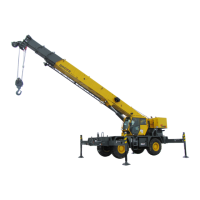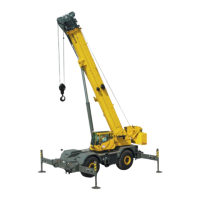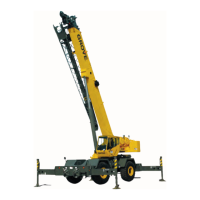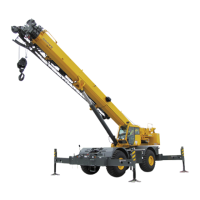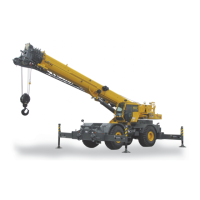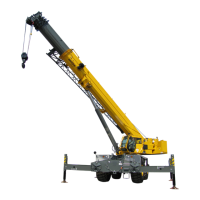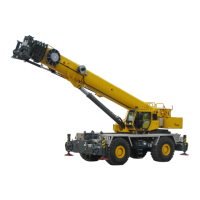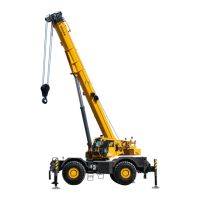Published 5-3-2016, Control # 555-02 3-17
RT530E-2 OPERATOR’S MANUAL OPERATING CONTROLS AND PROCEDURES
1. Stop the crane by depressing the Service Brake Foot
Pedal.
2. Position the Transmission Shift Lever to the neutral (N)
position.
3. Position the Drive Axle Selector Switch to four-wheel
low.
NOTE: If the Drive Axle Selector Switch is positioned to
four-wheel low and the Service Brake Foot Pedal is
not depressed and the Transmission Shift Lever is
not in neutral (N) position, the Four-Wheel Drive
Indicator will flash and the four-wheel drive function
will not engage.
4. Select gear speed and direction of travel using the
Transmission Shift Lever and Knob.
5. Drive the crane as described under Traveling —
Forward, page 3-15.
6. Return the Drive Axle Selector Switch to the two-wheel
high position as soon as two-wheel traction will suffice
and crane motion has stopped; again, the Service Brake
Foot Pedal must be depressed and the Transmission
Shift Lever must be in the neutral (N) position to shift
from four-wheel low to two-wheel high.
Differential Lock Operation (Optional)
NOTE: The differential lock will not operate unless the
Drive Selector Switch is in the four-wheel low
position.
General
The purpose of the differential lock is to provide maximum
traction and control on poor road or highway surfaces. When
the differential locks are actuated, the clutch collar
completely locks the differential case, gearing, and axle
shafts together, thus maximizing traction to both wheels of
each axle. The lock position will also protect against spinout.
When normal driving conditions exist (during periods of good
traction), the differential locks should not be actuated. The
axles should be allowed to operate with differential action
between both wheels.
Follow the steps below when engaging/disengaging the
differential lock function.
1. Lock the differentials by pressing and holding the Axle
Differential Control Switch in the lock position;
disengage the function by releasing the switch.
2. Lock/unlock the differentials only when the vehicle is
standing still or moving at a constant low speed with the
wheels not slipping.
3. Locked differentials cause the crane’s turning radius to
increase, creating an understeer condition; use caution,
good judgment and drive at low speeds when operating
the vehicle with locked differentials.
4. Lock the differentials only when maximum traction is
needed on poor road or highway surfaces.
5. Always unlock the differentials when the need for
maximum traction has passed or when traveling on good
road or highway surfaces.
Operation
The differential lock function should preferably be engaged
when the crane is stationary but may be engaged when
moving, if the following conditions are met:
1. The crane is moving very slowly (creep speed).
2. The wheels are not spinning at the time of engagement.
When traveling with the differentials locked, do not deviate
from a straight path more than is absolutely necessary.
Engage the differential locks by doing the following:
1. Position the Axle Differential Lock Control Switch to the
locked position with the crane stationary or moving at a
slow speed.
If moving at a slow speed, let up momentarily on the
Foot Throttle Pedal to relieve torque on the differential
gearing. This will fully engage the differential locks.
CAUTION
Unexpected Operation!
When using the differential lock, steering characteristics
may be affected.
Try to use four-wheel drive to gain adequate traction
before using the differential lock.
Do not operate the differential lock when traveling
downhill; at speeds above 16.1 km/h (10 mph); on hard,
dry surfaces; and/or during axle spin-out.
CAUTION
Possible Machine Damage!
When driving on hard, dry surfaces with the differentials
locked, do not turn the wheels. Damage to the drive line
components can result.
Do not lock the differentials when the wheels are slipping.
Damage to the differentials can result.
CAUTION
Possible Loss of Vehicle Stability!
Do not lock the differentials when the vehicle is traveling
down steep grades and traction is minimal.
Reference Only
